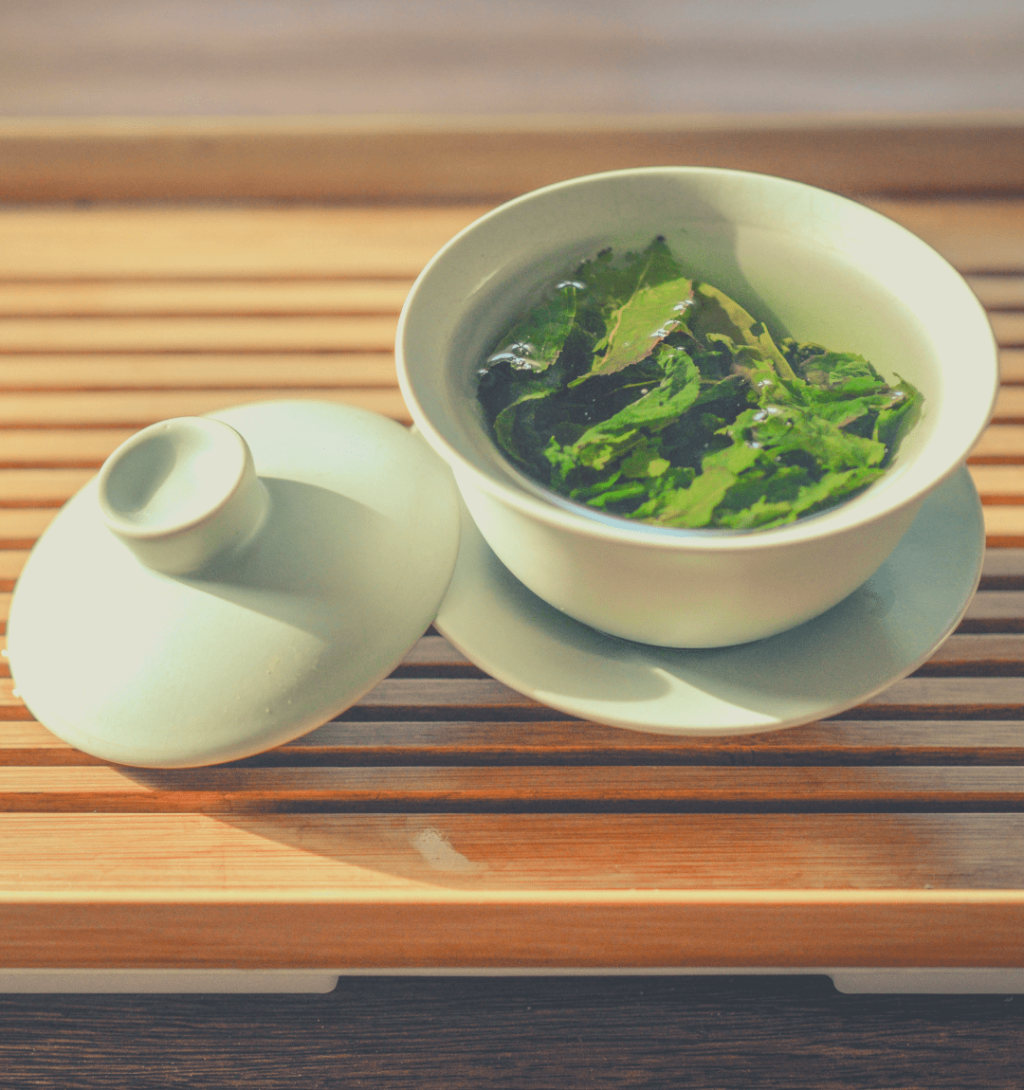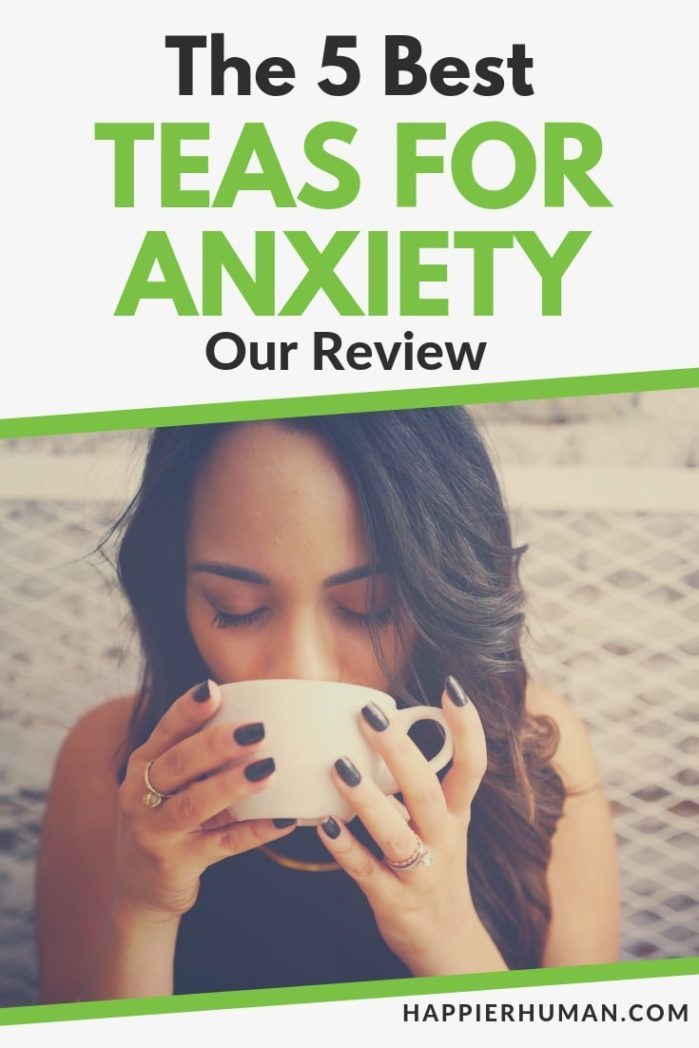There might be affiliate links on this page, which means we get a small commission of anything you buy. As an Amazon Associate we earn from qualifying purchases. Please do your own research before making any online purchase.
Do you find yourself feeling stressed or anxious a little too often? Does it keep you up at night or make you feel uncomfortable during the day? If so, then one natural solution is to drink tea that’s specifically designed to provide you with a calming experience.
Feeling a little anxious at times is normal, and even healthy—it is your body’s natural response during stressful situations. Anxiety stabilizes your breathing and heart rate and regulates the blood flow to your brain.
However, when your level of anxiety gets too high, your brain may not be able to control the number of stress hormones that it releases. This results in other symptoms such as headaches, dizziness, loss of focus, and depression.
There is no exact science to curing anxiety, but there are a lot of home remedies available to soothe your mood. And as you probably already know, drinking tea is one of your best options. Research shows that tea can have a calming effect on your mind and body.
But with all the various kinds of teas available on the market today, how do you know which one is the best to drink to address your anxiety? How do you determine which one to purchase?
In this post, we’ve reviewed the five best teas for anxiety and other mood disorders. We have categorized them based on their effects, and what particular mood they address.
But before we introduce the top products, we would like to share with you some information we have gathered regarding the benefits of tea. We will also take a look at the different types of teas, and what to consider when you're drinking tea.
(Side note: Want a simple way to reduce your stress and anxiety? Then try writing these 35 mindfulness journaling prompts to live more in the present moment).
What You Will Learn
- What Are the Different Types of Teas?
- Why Is Drinking Tea Good for Your Body?
- What to Remember When Drinking Tea
- The 5 Best Teas for Anxiety
- 1. Best Overall Tea for Anxiety
- 2. Best Tea for Mental Alertness
- 3. Best Relaxation Tea for a Good Night's Sleep
- 4. Best Soothing Green Tea To Calm your Nerves
- 5. Best Tea Choice for Detoxification
- A final word on calming teas for anxiety
Don't have time to read the entire review?
If you're a busy person who doesn't have time to read this entire review on teas for anxiety, we've simplified everything. Here is a table that gives you a quick rating of the best teas for anxiety.
Product |
Best Choice For… |
Our Rating |
|---|---|---|
| Yogi Green Tea Super Antioxidant | BEST OVERALL | 5 |
| The Republic of Tea Serenity SuperGreen Tea | Best tea to keep you calm and stabilize your mood | 5 |
| The Republic of Tea Ginger Peach Black Tea | Best tea for mental alertness | 4.5 |
| Traditional Medicinals Organic Nighty Night Valerian Relaxation Tea | Best tea for relaxation and good night’s sleep | 4.5 |
| The Republic of Tea Moringa Superherb Tea | Best tea for detoxification | 4 |
What Are the Different Types of Teas?
There are five kinds of pure and true teas. The differences between teas come from the method of processing the tea leaves, the growing conditions of the plant, and the geography of where the tea is grown. Here are the five types of teas:
Black Tea
Black tea is the most common type of tea consumed. During the processing stage, this type of tea is fermented and oxidized, giving it its strong amber/dark-brown color and bold savory/sweet flavor. Black tea has the highest content of caffeine out of all the different types of tea, with 5.25 mg of caffeine per ounce.
Black tea is rich in antioxidants such as polyphenols and catechins, which are beneficial to your health. In fact, studies show that black tea can protect your lungs from damage brought on by smoking or exposure to smoke. Drinking black tea can also reduce your risk of developing cancer, diabetes, heart disease, and stroke while improving your digestion, asthma symptoms, bone density, and oral health.
Green Tea
Green tea has the highest amount of antioxidants, which can protect your body against different kinds of diseases. Because green tea is not highly processed before it's served, it's rich in catechins, which are antioxidants that reduce free radicals in your body and fight against cell damage. The bioactive compounds in green tea help improve brain function, increase fat loss, and lower your risk of cancer.
Green tea is also high in L-theanine, which increases the activity of GABA in the brain (which is an inhibitory neurotransmitter). This has anti-anxiety effects on the brain, and can increase dopamine and the production of alpha waves as well.

Oolong Tea
Oolong tea is mainly used for overall mental performance. It can keep your mind alert and focused all day. Oolong tea falls somewhere between green and black tea when it comes to strength because its leaves are partially oxidized. This tea contains critical vitamins and minerals, including calcium, manganese, copper, potassium, selenium, magnesium, and detoxifying alkaloids.
Oolong tea can help control diabetes, remove free radicals, fight cancer, improve mental alertness, and improve bone health. Additionally, the natural polyphenols that can be found in oolong tea work to relieve anxiety.
Pu-erh Tea
Pu-erh tea is a combination of black, green, and oolong tea. It is a microbially fermented tea that is formed through the activity of molds, bacteria, and yeasts that are found on harvested tea leaves. Aside from mental alertness, it is also known to regulate blood cholesterol levels, cleanse your body of free radicals and toxins, prevent cancer, protect bone health, reduce stress, and prevent illnesses.
White Tea
White tea undergoes the least amount of processing, so it is able to retain high levels of phytochemicals. It also takes less time and labor to produce than black or green tea. White tea is known to combat the signs of skin aging due to its antioxidants, and aid in weight loss. It also helps reduce the risk of cancer, improve heart health, and boost oral health.
With its antibacterial properties, white tea can also protect you from bacteria that can lead to infection. Diseases are mainly caused by pathogens that attack the immune system and make it challenging for the body to function. Consuming white tea helps kill infection-causing bacteria and other harmful microorganisms.
Now that we have touched on the different types of teas, let's look at the overall benefits of drinking tea.
Why Is Drinking Tea Good for Your Body?
Researchers credit tea’s beneficial health properties to its antioxidants, polyphenols, and phytochemicals. Tea's antioxidants are primarily known to fight the free radicals that damage the cells in your body.
The antioxidants in tea can also protect you from a variety of cancers. Damage from free radicals has been linked to cancer, cardiovascular disease, and neurological degeneration, so drinking anything to help reduce these (such as white tea) will benefit your health.
Additionally, drinking tea may reduce the risk of having a heart attack, stroke, and other diseases. It can also help lower your cholesterol and blood pressure levels.

Drinking tea can help you lose weight by regulating your metabolic rate and digestion. In one study, participants who drank tea on a regular basis had a lower waist circumference and lower BMI than those who did not drink tea. Scientists believe that drinking tea on a regular basis lowers the risk of metabolic syndrome, which can lead to diabetes, artery disease, and stroke. The antioxidants in tea help increase your body’s ability to burn fat instead of muscle as fuel, which also helps improve muscle endurance.
Because it keeps you hydrated, tea keeps your digestion system working properly, and helps your body rid itself of waste. It also allows you to burn more calories during the day due to its caffeine content.
Drinking tea benefits your mental health in several ways, as well. It reduces the risk of cognitive impairment and can improve short-term memory. The polyphenols in tea may help nourish the areas of the brain that regulate memory and learning.
Most of all, drinking tea can reduce your anxiety and stress levels. It regulates your mood and decreases irritability and nervous tension. Many studies have already proven that drinking tea can help you remain calm while staying focused and alert.
Tea drinking is a slow, calming activity that can help reduce anxiety just through the process of enjoying it. When you're anxious, you need that opportunity to sit back and let yourself relax. The simple act of sipping tea is the kind of naturally relaxing activity that can be healthy for your spirit.
Now that you know why you should drink tea, let's talk about how you should drink tea to get the most anxiety relief.
What to Remember When Drinking Tea
You need to limit drinking your tea drinking to in between meals only. Teas contains flavonoids, a certain kind of antioxidant that may complicate the iron your body gets from the food you eat (while drinking tea). Flavanoids can bind to the plant-based iron that you eat, decreasing your body's ability to absorb it by up to 64%.
You also want to limit the amount of pre-brewed tea that you drink. When you brew tea and drink it plain, it does not contain sugar or calories. However, many bottled and instant teas today are overloaded with sugar and calories, which can quickly add up.
Also, drinking too much black tea per day (whether you brew it or buy it pre-brewed) can result in headaches, diarrhea, irregular heartbeats, and heartburn (as well as other side effects). Although black tea only contains a small amount of caffeine, if you drink it repeatedly throughout the day, you will exceed the healthy limit of caffeine that your body can handle.
Cup & Leaf reports that green tea may cause side effects such as stomachaches, sleeping problems, and bleeding disorders, especially in those suffering from gastrointestinal issues, iron deficiency, a low caffeine tolerance, anemia, anxiety, bleeding disorders, cardiovascular conditions, diabetes, liver conditions, osteoporosis, and women who are pregnant or nursing. It is best to drink tea when it’s freshly brewed and slightly cooled. Tea that is very hot can damage your digestive system and even promote throat cancer.
While there can be other side effects if you drink too much tea, it is important to remember that these side effects may only occur if you consume tea in excess, or have a pre-existing condition of some sort that could interact with tea.
With this in mind, let's look at the top teas on the market today to find the best option for sleep and anxiety.
The 5 Best Teas for Anxiety
1. Best Overall Tea for Anxiety
This is the best tea to combat stress and anxiety. It is purposefully formulated to provide you with antioxidants and reduce the free radicals in your body. This tea is a special combination of green tea, grapeseed extract, and amla extract, which work together to supply potent antioxidants. This tea also contains lemongrass (which adds a citrus flavor), and licorice and jasmine teas to add some sweet, floral notes.
Each cup of this tea offers 21 mg of caffeine through the non-GMO ingredients. The teabags are non-bleached, which is in line with this company's environmental values.
PROS
- Tastes great
- Best tea to combat stress and anxiety
- Provides natural energy
CONS
- Some drinkers wish this tea were stronger
- There may be an inconsistency between batches
- Some notice an aftertaste
2. Best Tea for Mental Alertness
This is the best tea for mental alertness. It combines sweet and spicy flavors with black tea to make a delicious drink served hot or cold. Adding the perfect amount of ginger to the sweetness of peaches creates a satisfying and balanced taste.
Each cup of this tea has less than half of the caffeine that is in a cup of coffee. It comes packaged in a uniquely designed tin that seals out air and light. The tea is encompassed in a simple, bleach-free bag, and its contents are certified gluten-free, sugar-free, and carbohydrate-free.
PROS
- Has a great fruity flavor
- Great for mental alertness
- Fair price
CONS
- Some people report needing to use two tea bags per cup
- Some people find the flavor sinks to the bottom
3. Best Relaxation Tea for a Good Night's Sleep
This is the best tea for relaxation and a good night’s sleep. It is comprised of mostly organic herbal ingredients that are known to calm your nervous system, including passionflower, which is known for its ability to soothe the nervous system. This product also contains valerian, which is a popular herb that is known for its use in treating occasional sleeplessness.
Offering a pleasant, mildly bittersweet, minty, earthy taste, Nighty Night Valerian Relaxation Tea is perfect to drink before bed, as it promotes a good night's sleep. All of the ingredients in this tea are certified organic, kosher, and GMO-free. This is the best tea for overall relaxation.
PROS
- Reduces pre-bed anxiety
- Some have reported they discontinued sleep aids after finding this tea
- Not only does this tea help you fall asleep, but it also helps you stay asleep as well
- One of the best teas for anxiety and panic attacks
CONS
- May cause intestinal discomfort
- Teabags have a bad smell
- Teabags are not strong and tend to fall apart
4. Best Soothing Green Tea To Calm your Nerves
This is the best option if you want to be able to keep calm and stabilize your mood. Serenity SuperGreen Tea combines organic matcha powder and organic green tea leaves with herbs that help your body feel calm, centered, and balanced.
Tulsi is also included in the contents of this tea, which is an Ayurvedic adaptogen that works to decrease stress and relax the mind and body. Tulsi is often used to treat the common cold, flu, bronchitis, ear pain, headache, upset stomach, cardiovascular disease, viral hepatitis, anxiety, malaria, and tuberculosis. It has also been used to help promote longevity. The chemicals in tulsi are known for their ability to decrease inflammation, and they may lower blood sugar in people who are suffering from diabetes.
Users have found that while this tea tastes decadent, it can help you lose weight if you drink it regularly. It has a slightly floral, mildly sweet taste that is very soothing. This is the perfect tea for sipping at night after a long day.
PROS
- The lavender in this tea has additional calming effects.
- Great for stabilizing mood.
- Great tea for depression and anxiety.
- Flavor is strong but not overpowering.
CONS
- Some people don't like the flavor.
- Tea leaks from the bags.
5. Best Tea Choice for Detoxification
This is the best tea for detoxification. The popular tea uses moringa tree leaves, which are known for their nutritious compounds and life-altering health benefits. The moringa leaves used in this tea are rich in antioxidants, vitamins, and nutrients. This tea has a hint of mint, some floral notes, and an earthy taste to it.
PROS
- Users have a perceived immunity boost.
- It helps with clear thinking.
- Budget-friendly.
CONS
- Some people find unpleasant aftertaste.
- Tea tends to be weak.
A final word on calming teas for anxiety
The list we have provided above are the top picks when it comes to the best teas for anxiety, according to positive customer reviews and high ratings.
But our winner is Yogi Green Tea Super Antioxidant for its total rejuvenating effects that can support your body’s overall defense against free radical damage. Try a few of these relaxing tea blends to see which works best for you.
Finally, if you want a simple way to reduce your stress and anxiety, then try writing these 35 mindfulness journaling prompts to live more in the present moment.







